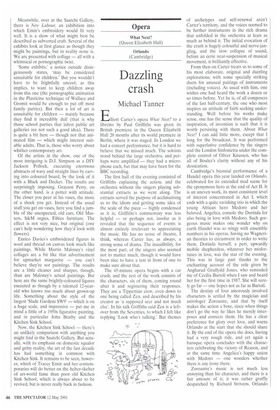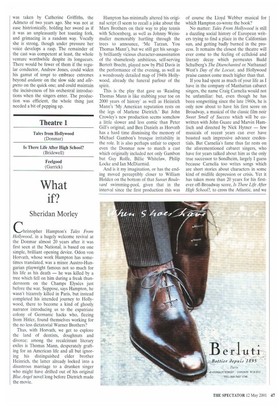Dazzling crash
Michael Tanner
Elliott Carter's opera What Next? to a libretto by Paul Griffiths was given its British premiere in the Queen Elizabeth Hall 20 months after its world premiere in Berlin, where it was staged. In London we had a concert performance, but it is hard to believe that we missed much. The soloists stood behind the large orchestra, and perhaps were amplified — they had a microphone each, but that may have been for the BBC recording.
The first half of the evening consisted of Griffiths explaining the action, and the orchestra without the singers playing substantial extracts as we went along. The extracts served the purpose of acclimatising us to the idiom and getting some idea of the scale of the piece — highly condensed as it is; Griffiths's commentary was less helpful — or perhaps not, insofar as it revealed that the sequence of events is almost entirely irrelevant to appreciating the music. He has no sense of theatre, I think, whereas Carter has, as always, a strong sense of drama. The inaudibility, for the most part, of the singers also seemed not to matter much, though it would have been nice to have a text in front of one to make sure about that.
The 45-minute opera begins with a car crash, and the rest of the work consists of the characters, six of them, coming round after it and registering their responses. They are a Tippettian crew, even down to one being called Zen, and described by his creator as 'a supposed seer and not much else'. In his talk Griffiths said Zen is a leftover from the Seventies, to which I felt like replying 'Look who's talking.' But themes of archetypes and self-renewal aren't Carter's territory, and the voices seemed to be further instruments in the rich drama that unfolded in the orchestra at least as much as behind it. The initial evocation of the crash is hugely colourful and nerve-jangling, and the slow collapse of sound, before an eerie near-suspension of musical movement, is brilliantly effective.
From then on Carter treats us to some of his most elaborate, original and dazzling explorations, with some specially striking duets for unusual pairings of instruments (including voices). As usual with him, one wishes one had heard the work a dozen or so times before. Yet he is, of all composers of the last half-century, the one who most inspires an attitude of faith seeking understanding. Well before his works make sense, one has the sense that the quality of inspiration, of invention is such that it is worth persisting with them. About What Next? I can add little more, except that I long for the broadcast. It was performed with superlative confidence by the singers and the London Sinfonietta under the complete control of Oliver Knussen, who has all of Boulez's clarity without any of his dessication.
Cambridge's biennial performance of a Handel opera this year landed on Orlando, celebrated for its extended mad scene for the eponymous hero at the end of Act H. It is an uneven work, its most consistent level of interest concentrated in Act I, which ends with a quite ravishing trio in which the young African hero Medoro and her beloved. Angelica, console the Dorinda for also being in love with Medoro. Such gorgeous music makes one wonder why on earth Handel was so stingy with ensemble numbers in his operas, having no Wagnerian theories to circumvent in order to write them. Dorinda herself, a pert, upwardly mobile shepherdess, whatever her misfortunes in love, was the star of the evening. This was in large part thanks to the enchanting account of the role given by Angharad Gruffydd Jones, who reminded me of Cecilia Bartoli when I saw and heard her for the first time in 1987. She will surely go far — one hopes not as far as Bartoli.
The destiny of four amorously involved characters is settled by the magician and astrologer Zoroastre, and that by itself makes the action a bore, since when things don't go the way he likes he merely interposes and corrects them. He has a clear preference for glory over love, and warns Orlando at the start that she should share it. By the end of the opera she does, having had a very rough ride, and yet again a baroque opera concludes with the characters celebrating the victory of Reason, and at the same time Angelica's happy union with Medoro — one wonders whether there is any irony there.
Zoroastre's music is not much less annoying than his character, and there is a fair amount of it; it was rather gruffly despatched by Richard Strivens. Orlando
was taken by Catherine Griffiths, the Admeto of two years ago. She was not at ease histrionically, holding her sword as if it was an unpleasantly hot toasting fork, and grimacing in a random way. Vocally she is strong, though under pressure her voice develops a rasp. The remainder of the cast was competent at least, the whole venture worthwhile despite its longueurs. There would be fewer of them if the regular conductor, Andrew Jones, could widen his gamut of tempi to embrace extremes beyond andante on the slow side and allegretto on the quick one; and could maintain the incisiveness of his orchestral introductions when the singers enter. The production was efficient, the whole thing just needed a bit of pepping up.



































































 Previous page
Previous page